Random House
Recipe for an Ecosystem
Creating an ecosystem is as simple as baking a cake. Well, maybe not, but using a recipe analogy helps learners realize that ecosystems consist of different components that come together in unique ways. Offer this worksheet as an...
Curated OER
Scavenging the Sandy Shore
Students explore oceanography by examining a beach. For this living things lesson, students define the terms abiotic and biotic and practice identifying living and non-living things that have been previously found on a beach. Students...
Curated OER
Vocabulary: Kansas Prairies
Students explore the ecosystem by reviewing scientific vocabulary terms. For this environmental awareness lesson, students identify the differences between abiotic and biotic factors and their relationship to the Earth. Students define...
Curated OER
Hawaii's Sandy Shores
Investigate Hawaii's sandy shore ecosystem! Start by creating a vocabulary list and having your class complete a KWL chart. Next, pass out the "I think of" sheet. Each learner will then choose a word from a beach bucket and add it to...
Curated OER
Adopt An Ecosystem
Tenth graders choose an ecosystem to observe the interaction of living organisms with biotic and abiotic factors in that ecosystem. They keep journals of observations and reflections in order to have a resource for further...
Curated OER
Hands on Biome-Building: Build a Forest
Learners explore Earth science by identifying environmental factors. For this biome lesson, students discuss the importance of a functioning ecology and design a biome diorama. Learners utilize images of trees and plants which represent...
Curated OER
Fire Ecology
Fourth graders examine the role fire plays in maintaining the physical factors of the scrub ecosystem. They see that world ecosystems are shaped by physical factors that limit their productivity.
Curated OER
U.S. History: Antebellum Heroes and Villains
Eighth graders research and write reports on key figures of the Antebellum Period. The projects also include pictures, bibliographies, and timelines about their assigned figure. In addition, 8th graders present oral reports to classmates.
Curated OER
Ecosystem Interactions in Refuges
Seventh graders, using national parks as models, illustrate the energy flow in ecosystems. Working in groups, they use murals, flow charts, or other visual displays to record their findings. Students represent the food chains and webs...
Curated OER
Hands on Biome-Building
Students explore Earth science by participating in an environment activity. For this biome lesson, students discuss the importance of a healthy ecology in order to sustain life, both animal and plant. Students utilize a cardboard or wood...
Curated OER
Dirty Decomposers
Students explore the ecosystem by conducting a ziploc bag experiment. In this recycling lesson, students identify decomposer organisms in our environment and how they speed up the recycling process. Students utilize a ziploc plastic bag,...
Curated OER
What Lives in the Open Ocean and Where Do They Live?
Students explore oceanography by participating in a flash card activity. In this ocean inhabitant lesson, students define a list of ocean related vocabulary terms and answer ocean geography study questions. Students utilize organism...
Curated OER
Where Do Birds Live? Cavity Nesters of the Watsonville Wetlands
Students compare and contrast primary and secondary cavity nesters. In this life science instructional activity, students explore the different types of nests that birds make. They play a team game to apply what they learned.
Curated OER
Whose Breakfast isn't for the Birds?
Students explore coffee production. In this cross-curriculum rainforest ecology lesson, students research regions where coffee comes from and investigate how the native birds in the rainforest are effected by coffee...
Curated OER
Chihauhan Desert Journaling Activity
Learners explore U.S. geography by completing an observational activity with classmates. In this New Mexico lesson, students research the Chihuahuan Desert by visiting several Internet sites. Learners write the data they've collected in...
Curated OER
Build an Ice Cap
Students research Earth science by conducting an experiment in class. In this ice-cap lesson, students identify what an ice cap is and create a biome using a box which measures 1 ft. x 1 ft. Students participate in an animal role-playing...
Curated OER
Build the Taiga: Hands on Biome-Building
Learners explore environmental awareness by completing a construction project. In this biomes lesson plan, students identify the different elements for life to thrive in an ecosystem. Learners utilize a cardboard or wood box to create a...
Curated OER
What's in Our Woods?
Young scholars observe their local forest and document the change that occurs over the school year. For this forestry lesson, students utilize a GPS to mark a certain area of the woods as their study area for the remainder of the...
Curated OER
Seed Germination
Students explore plants and the scientific method. In this plant growth lesson, students follow the steps in the scientific method to perform a seed germination experiment as a whole class. Students work in a group to create their own...
Curated OER
Using Sterile Techniques as a Tool in Studying Plant Diseases
Seventh graders examine the concept of sterile techniques. They realize that plant diseases can be identified and classified in various way. Students identify some of the diseases that attack the garden plants.
Curated OER
Ecosystem Interactions Web
Students pick an ecosystem (forest, desert, coral reef, open ocean, grassland, mountain, savanna, etc.) and design an interaction web for their chosen ecosystem. Each group shares their ecosystem's web of life with the class.
Curated OER
Habitat Dynamics
Students develop an interactive diary to record bird seed consumption. In this habitat lesson plan, students predict and record the amount of birdseed eaten each week by birds.
Curated OER
The Food Web
Students explore the role that the Arctic hare plays in the Canadian Arctic food web.
ArtsNow
Arts Now Learning: Dramatic Living and Non Living [Pdf]
Students explore the differences between living and nonliving things through the lens of the nursery rhyme, "Hey Diddle Diddle." After bringing the characters to life, the students discuss the concepts of living and nonliving and act out...
Other popular searches
- Biotic Abiotic
- Biotic and Abiotic Factors
- Biotic and Abiotic
- Abiotic Biotic Environment
- Abiotic Elements
- Abiotic and Biotic Elements
- Abiotic and Biotic Resources
- Biotic Abiotic Factors
- Abiotic Biotic Lab
- Ecosystems Abiotic Biotic
- Biotic Abiotic Pictures
- Abiotic Factors River




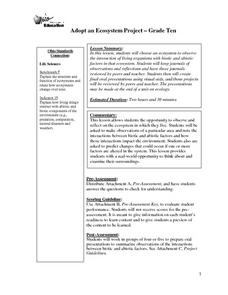
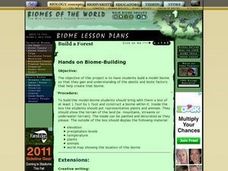

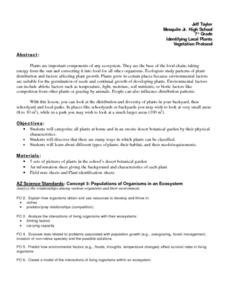





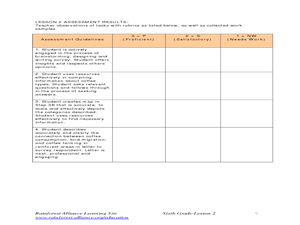
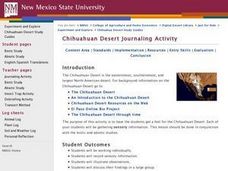






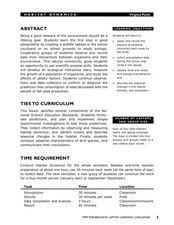

![Arts Now Learning: Dramatic Living and Non Living [Pdf] Lesson Plan Arts Now Learning: Dramatic Living and Non Living [Pdf] Lesson Plan](https://d15y2dacu3jp90.cloudfront.net/images/attachment_defaults/resource/large/FPO-knovation.png)